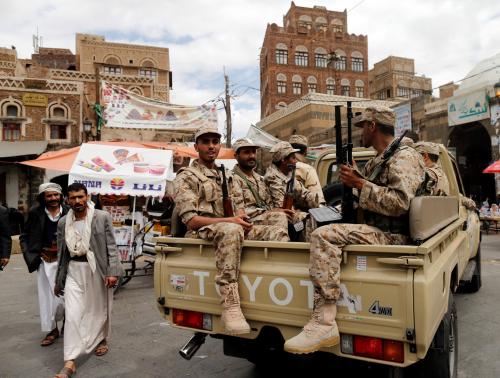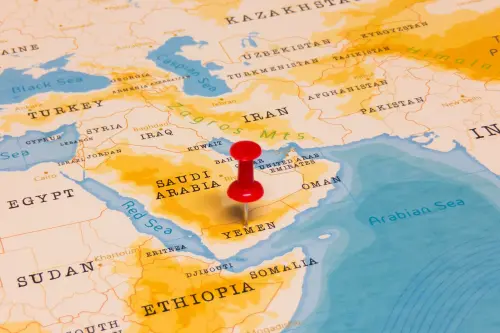Shibley Telhami is a Professor of Government and Politics at the University of Maryland.
It is important to remember that any agreement, no matter how good the terms are for one side or the other, will face militant opposition by significant segments of the Israeli and Palestinian public. The hope rests not with getting universal acceptance, but by garnering robust majorities to overcome the inevitable opposition.
The good news is that Palestinian and Israeli negotiators will have another shot at a comprehensive framework agreement before Bill Clinton leaves the White House. The bad news is that their obstacles have only grown since the failed Camp David summit in July.
To be sure, the parties are closer than ever to an agreement on Jerusalem, the issue that was the deal breaker at Camp David, and they have narrowed the gap on many other critical issues. But the obstacles they now face are no longer limited to the significant reservations they still have, especially on the issue of the “right of return” of Palestinian refugees. They must also face a dramatically changed psychological environment among Israelis and Palestinians.
For Palestinians, the mood is not merely of rage over the death of hundreds and the wounding of more, but it is also of a newly found sense of empowerment that the Al-Aqsa Intifada has provided ordinary people.
In the seven years since the Oslo accords, most Palestinians have watched helplessly as events unfolded. They felt little control over Israeli actions, U.S. policy or the behavior of their own authority as their lives sometimes went from bad to worse. Despite all the tragic losses of the past few months, Palestinian self-confidence has been revived by the Intifada, with most Palestinians acquiring a sense of power vis-a-vis the Palestinian Authority, Israel and even the White House.
They feel the power to mobilize Arabs and Muslims elsewhere in ways they have not witnessed in years. Given the little trust they have in peace agreements, based on past experience, they see the scramble for a deal as a trick not only to save Ehud Barak’s career but also to end the Intifada and rob them of the sense of empowerment—without leading to a lasting peace.
This singular fear today is the greatest obstacle Yasser Arafat faces in selling a possible agreement with Israel—greater than the weight of any single issue in the negotiations.
On the Israeli side, the obstacles are also greater than the very difficult issues of Jerusalem and refugees.
The confrontation over Jerusalem, the religious and ethnic violence that spread inside Israel itself and the Intifada more broadly have shaken the Israeli public and revived profound old fears. Much of the Israeli left is experiencing deep anxieties akin to the loss of innocence. The minimal trust in the Palestinian leadership and its ability to deliver an agreement and overcome the passions of its public has all but collapsed. Will a signing celebration at the White House be enough to persuade them to take a leap of faith when they go to the polls on Feb. 6?
Despite the odds, Mr. Barak and Mr. Arafat may be inclined to make a serious effort to clinch a framework deal in the next two weeks. The issue is not merely avoiding international blame, and the blame of a new U.S. administration, if the peace process collapses—although this issue is high on the minds of both sides. There is also a genuine fear of the consequences of failure. The political careers of Mr. Barak and Mr. Arafat are not the only things at issue. So are the prospects for a negotiated settlement in any foreseeable future.
The significant casualties of violence over the past few months are tragic enough, but if the prospects of a quick agreement disappear, the Palestinian-Israeli conflict will almost certainly witness significant escalation in violence that could spin out of control and drag others in the region into the conflict.
Even more dangerously, it could complete the transformation of the conflict from a nationalist one that lends itself to resolution into an ethnic-religious conflict that is harder to resolve, and that could result in a civil war between Arabs and Jews in Israel itself.
The costs of failure justify taking the risk of reaching an agreement that will face an uphill battle domestically for both Mr. Arafat and Mr. Barak. It is important to remember that any agreement, no matter how good the terms are for one side or the other, will face militant opposition by significant segments of the Israeli and Palestinian public. The hope rests not with getting universal acceptance, but by garnering robust majorities to overcome the inevitable opposition. This should be the goal that defines the terms of any agreement.
For the United States, the stakes are higher than Mr. Clinton’s legacy. As we have witnessed in the past few months, the Palestinian-Israeli conflict is now a broader Arab-Israeli conflict that affects vital American interests. That’s why President-elect George W. Bush has become Mr. Clinton’s biggest booster.



Commentary
Op-edPrice of Peace Less Than War
January 5, 2001